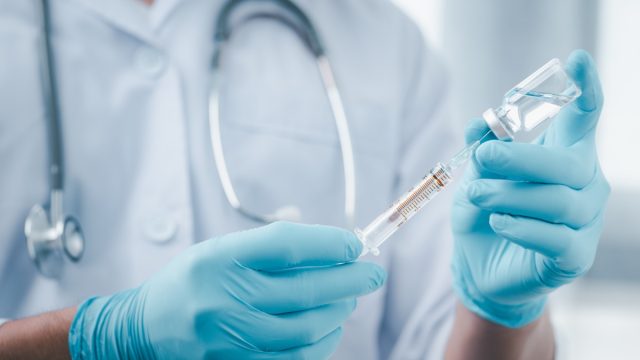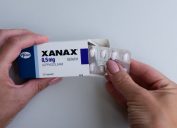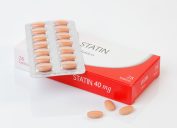New Vaccine Could Slash Your High Cholesterol by 30%, Researchers Say
It could be a more affordable and equally effective option for patients.

If you've gotten word from your doctor that you have high cholesterol, you're not alone: According to the Centers for Disease Control and Prevention (CDC), nearly two in five adults in the U.S. have too much cholesterol. There are no symptoms that would indicate high levels—high cholesterol requires a blood test to detect—but having more fatty deposits in your blood vessels can spike your risk of heart disease, the leading cause of death in the U.S., per the Mayo Clinic. Because of this, cholesterol is something you want to get under control, with doctors often recommending lifestyle changes and/or medications. However, researchers at the University of New Mexico (UNM) may have a new option: a vaccine.
RELATED: New Treatment Could Halve Your Cholesterol, Researchers Say—And It's Not Statins.
According to a Dec. 14 press release from UNM Health, researchers developed a new vaccine that can lower low-density lipoprotein (LDL)—AKA "bad" cholesterol—which creates plaques that make it difficult for blood to flow through your arteries. According to findings from a study of the treatment published in September in NPJ Vaccines, animals that received the vaccine had up to a 30 percent reduction in cholesterol levels. The vaccine has not yet been studied in humans.
In the press release, researchers said that the vaccine may be a "game-changer" in the world of cholesterol treatment, offering an inexpensive treatment option that's nearly as effective as PCSK9 inhibitors, which can be pricey. (According to the Cleveland Clinic, two PCSK9 injections are approved by the U.S. Food and Drug Administration: alirocumab and evolocumab, better known by the respective brand names, Praluent and Repatha.)
"We are interested in trying to develop another approach that would be less expensive and more broadly applicable, not just in the United States, but also in places that don't have the resources to afford these very, very expensive therapies," Bryce Chackerian, PhD, study lead and Regents' Professor in the UNM Department of Molecular Genetics & Microbiology, said of the vaccine in the press release.
While they are expensive, PCSK9 inhibitors, which are a newer class of drugs, can be "life-saving," lowering LDL cholesterol and risk of heart attack, stroke, and death, Abinash Achrekar, MD, MPH, cardiologist, and vice chair and professor in the UNM Department of Internal Medicine, explained in the press release.
The shots target the PCSK9 protein, a molecule made in the liver that "negatively regulates the metabolism of LDL cholesterol" as it goes through the bloodstream. The more your body makes of this protein, the higher your LDL cholesterol is, Achrekar added.
RELATED: How Much People Really Gain Back After Quitting Weight-Loss Drugs, New Study Finds.
Now, the vaccine is taking the same approach and targeting the PCSK9 protein, eliciting comparable positive effects with a lower price tag. To do this, Chackerian attached a small piece of the PCSK9 protein to the surface of a non-infectious virus particle.
"The vaccine is based on a non-infectious virus particle," Chackerian shared. "It is just the shell of a virus, and it turns out that we can use that shell of a virus to develop vaccines against all sorts of different things."
When the vaccine enters the body, it prompts a "really strong antibody response" against the PCSK9 protein, Chackerian said. The vaccine treatment has been tested on mice and monkeys over the past 10 years "with promising results," he added.
Now, researchers are working on securing funding for manufacturing and human clinical trials. Once the vaccine is available for humans—which Chackerian said could be possible in the next 10 years—researchers estimate that it will be less than $100 per dose thanks to the "simple and relatively inexpensive bacteria" used to make it. In addition, Chackerian noted that each dose will be effective for almost a full year.
RELATED: For more up-to-date information, sign up for our daily newsletter.
Best Life offers the most up-to-date information from top experts, new research, and health agencies, but our content is not meant to be a substitute for professional guidance. When it comes to the medication you're taking or any other health questions you have, always consult your healthcare provider directly.





















